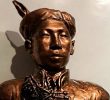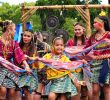There will be the long bus ride again, the long walk back to their homes, where unlike the Kadayawan, a celebration for a harvest does not happen anymore.
By KRISTA V. MELGAREJO
Davao Today
DAVAO CITY, Philippines — Clad in their ethnic garb, they braved the crowded passages of the city streets where the roads are made of concrete so unlike what they have treaded on all their lives.
Young lumad couple Buknoy Minaray, 22, and wife Lusinta, 19, came down from the hinterlands of Marilog District which sits in the boundaries of Davao City and Bukidnon province, just to arrive in the city.
The Minarays were with other Matigsalog tribe members who were billeted by the local government in Magallanes Elementary School for the Kadayawan. Six classrooms were reserved for their short stay.
But Buknoy and Lusinta did not come here for the festivity. They were here to earn money.
Back home in Marilog their crops were destroyed by mice infestation. They were hoping their handicrafts would make up for the lost harvest.
For days, they roamed around the city to sell their handmade bracelets made out of a kind of forest vine called nito. But the long walks under the scorching heat of the sun did not pay off.
Even if the streets teemed with people who wanted to watch the “Indak-Indak” (street dance competition) on Saturday, still, they hardly regained the little money they brought to use for their daily expenses in the city.
Their sales from the bracelets hardly reached 500 pesos (USD 1.42), not even enough to pay up the 450 pesos (USD 9.43) costume they were made to wear, a rip-off from the ones designed by their ancestors.
“Ginapasuot mi ani para daw mailhan na lumad mi (We were made to wear this so the people would know we are indigenous peoples),” Lusinta said.
The Kadayawan is derived from cultural practice of indigenous peoples’ expression of gratitude to the gods for a bountiful harvest but it has now evolved into an annual fare to attract tourists to Davao City.
Pedro Arnado of the peasant group Kilusang Magbubukid ng Pilipinas calls it ironic how ethnic tribes like the Matigsalogs, who have long been practicing the pahinungod or thanksgiving ritual for a bountiful harvest, are now suffering from little produce or none at all.
Arnado particularly bewails the inaction of the Department of Agriculture (DA) on the problem of lumads like the couple Buknoy and Lusinta.
He said they learned that there was a fund supposedly allotted by the DA for the office of the city agriculturist of Davao to address the problem of rat infestation in the lumad hinterlands. “But it looks like they did not do anything about it,” Arnado said.
When the festivities are over, the City Government will give 150 pesos (USD 3.54) to each tribe member so they can all go back to Marilog.
There will be the long bus ride again, the long walk back to their homes, where unlike the Kadayawan, a celebration for a harvest does not happen anymore. (Krista V. Melgarejo/davaotoday.com)
World









